What to look out for in 2022
Posted by Stuart Bell
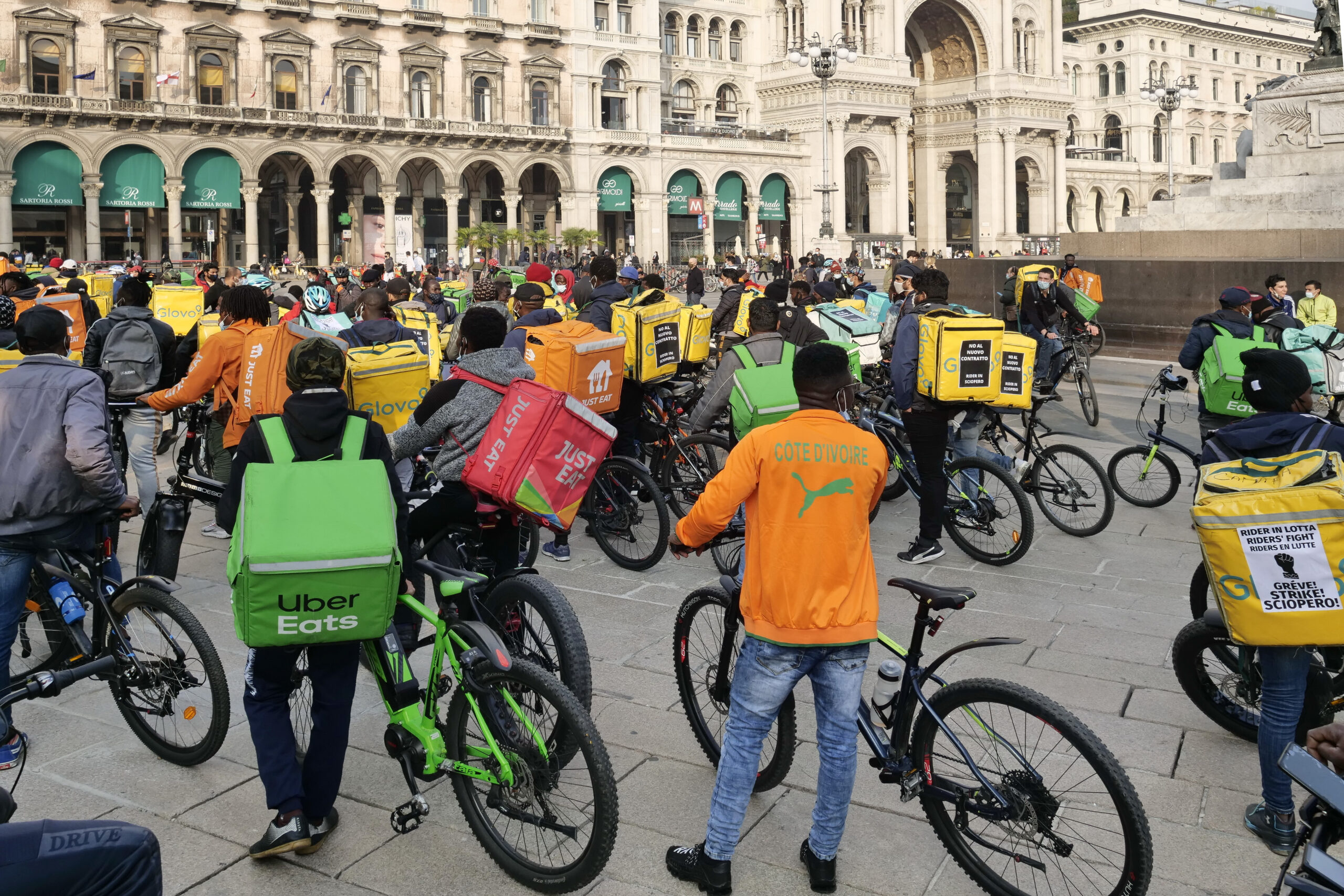
2021 has certainly been uniquely challenging and 2022 will continue to be full of uncertainty and surprises. In this article we share some of our thoughts on the key issues likely to affect the business and human rights space in 2022 – whether regulatory, thematic or structural. We are fortunate in working with leading multinational organisations and expert professionals, and many of these insights are based on our practical experience working over the last 12 months though delivery of our extensive programmes of advisory and research services.
We wish everyone in our networks a happy, healthy and peaceful 2022.
- Ongoing push for mandatory due diligence legislation: prospects for new legal requirements on human rights
- The pandemic goes on – expect the unexpected
- The platform economy: continued growth and more protections for workers?
- Certification bodies: under scrutiny and bolstering social standards
- Fair COP? JustTransition? Increased focus on the human rights impacts of climate change
- Supply chain due diligence: from HRIAs to HRAPS – implementation and collaboration
- Testing year ahead for human rights in sport: from Beijing to Qatar
- ILO to add occupational safety and health as a Fundamental Right? First update since 1998 to Core Conventions
- Living wage to remain a live issue: more commitments and practical tools
Ongoing push for mandatory due diligence legislation
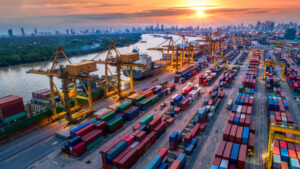
Legislation on mandatory human rights due diligence continues to gather steam – albeit mostly in Northern Europe. In summer 2021, the German Supply Chain Act and the Norwegian Transparency Act were both adopted. With preparations under way for the implementation of these laws – which will come into force in 2023 and July 2022 respectively – 2022 is expected to bring more clarity on how their provisions should be interpreted in practice. We anticipate that any emerging guidance for business on how to align their business conduct with the new legislation, will be of key relevance to various other legislative projects, including the prospective European Commission’s legislative proposal for a directive on Sustainable Corporate Governance.
European Commissioner Reynders’s announcement of forthcoming EU-level mandatory HRDD legislation in spring 2020 was a key moment, and this momentum was continued by the Commission’s due diligence guidance for EU businesses to address forced labour in their operations and supply chains, published in July 2021. After several delays, the Commission was set to publish the formal initiative in mid-2021 and then again in December 2021, but discussions have now been pushed to 2022. Both delays were the result of objections to parts of the proposal by the EU Regulatory Scrutiny Board (RSB). Rumours are that the proposal may not be forthcoming before the end of the first quarter of 2022. Pressure on the Commission to prevent further delays has been growing in recent weeks, including from MEPs and 47 civil society and trade union organisations. Although the recommendations for the Directive, adopted in March 2021 by the European Parliament, provide some insights into what the initiative could look like, much operational detail remains unclear – particularly in the light of a need for the Commission to address the, unpublished, concerns of the RSB.
Meanwhile, the delays at the EU level led the Netherlands to announce the proposal of a national due diligence law. Our Dutch team continue to keep a close eye on developments in the Netherlands. Despite the apparent advantages of legislation that applies to all of the EU, we could start to see other EU member states take the same unilateral approach, should the EU directive not advance at the expected pace. Meanwhile in the UK, there have been significant calls from major businesses, NGOs and unions for mandatory human rights due diligence legislation.
Another issue that needs to be determined at an EU level is how potential import bans for products made with forced labour would be covered by or interact with any Directive
Through 2022 we will continue to support businesses, national and international public bodies, civil society and others who wish to understand where their current and future performance on HRDD fits in the context of the emerging regulatory environment.
The pandemic goes on – expect the unexpected
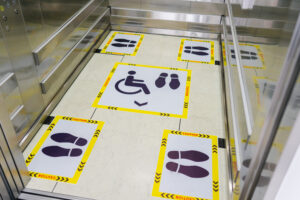
Continuing waves of variants of COVID-19 may be the norm for some time with varying degrees of disruption to labour markets, supply chains, travel and other economic activity, irrespective of the ongoing serious health implications.
The biggest impact is likely to be uncertainty, as the effects of the pandemic play out in unexpected ways. Women disproportionately shoulder the burden of this uncertainty, at home and at work. However, some trends seem inevitable. Labour markets in the developed world will continue to tighten, which combined with inflation, will lead to wage pressures and in turn, to further impetus towards automation where this is possible. Demand for unskilled (i.e., low cost) workers will come up against populist opposition to labour migration while creating incentives for illicit migration, with all the vulnerabilities that entails. We have already seen reports that the pandemic has reversed progress on child labour, and the long tail of the pandemic, and its legacy on access to education, healthcare and incomes, threatens to derail progress on a number of SDG targets, not least those relating to SDG 8.7.
The pandemic has exposed the fragility of many extended just-in-time supply chains and disruption is likely to persist, whether this be in food, clothing or electronics. Building greater resilience and sustainability into supply chains are watchwords for many companies but they can mean different things to different commercial functions. Whereas buying teams may want to diversify their supply base, this may involve working with suppliers who are outside risk assessment programmes operated by sustainability teams. Within the food sector, building security of supply will bring a growing emphasis on strategic relationship with longer-term suppliers, which also creates an opportunity to collaborate on higher social standards.
The pandemic has also shifted the focus of attention to previously under-exposed sectors such as shipping, road haulage and warehousing, as well as platform work more generally (see elsewhere). We expect to be devoting more resources to exploring these areas in the coming year.
The platform economy: ‘gig work’ – continued growth and more protections for workers?

COVID-19 has accelerated the number of people who earn a living within the platform or ‘gig’ economy and this growth is set to continue. Gig work creates opportunities for income and flexibility for many but it also often comes with challenges for workers, mainly around defining their legal status – and rights.
Court decisions related to worker status remain contested in many countries but there is new legislation in Spain and upcoming EU legislative proposals that would strengthen workers’ employment rights, as well as other important issues such as access to clear information on algorithms and decision making and giving workers appropriate channels for communication. Stakeholders are weighing in on how these issues are being addressed.
In our work, we are already seeing how some companies are embracing change and looking to provide better working conditions for platform workers, including switching to formal employment models, providing benefits to workers and leveraging tech to provide for health and safety. Ergon is working with investors to understand this continuously changing landscape, and particularly how platform companies can have a positive impact in emerging markets, where informality is the norm. We will be returning to these issues as a core area of our work during 2022.
Certification bodies: bolstering social standards
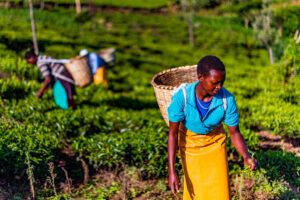
Recent years have seen ethical certification and standards organisations such as Fairtrade, Rainforest Alliance (RA), and the Better Cotton Initiative (BCI) reviewing how they detect and respond to potential instances of labour abuse, such as child labour and gender-based violence and harassment. This is against the background of a general perception that the ‘social’ components (labour, human rights, gender) of many certification standards have been weak relative to environmental or agronomic elements, a situation which is increasingly attracting scrutiny from both corporate users and civil society organisations.
2020-21 saw the introduction and announcement of major changes to the way some of these leading labelling systems operate, all of which will be tested in 2022. For example:
- Fairtrade has launched a new base wage for all Fairtrade banana producers, raising wages for many thousands of workers. The challenge for Fairtrade in 2022 will be figuring out how to scale to other crops and commodities and ensure all value chain actors from brands to producers are paying a fair share. Part of the answer may be through partnerships with other coalitions such as IDH – see ‘Living wage to remain a live issue’ below.
- Following Rainforest Alliance’s merger with UTZ, the social aspects of its Farm standard have undergone a near complete transformation. More of the standard is now focused on working and living conditions for farm labourers, and new evidence-based approaches have been introduced to improve the effectiveness of the standard with respect to human rights and labour standards. A large segment of certificate holders will transition to the new system in 2022.
- The Better Cotton Initiative has announced plans to onboard a set of ambitious recommendations from a multi-stakeholder advisory group convened to review BCI practices on forced labour and wider decent work.
Ergon has a long-standing track record supporting certification and standards bodies in their efforts to strengthen and implement social standards.
Fair COP? JustTransition?
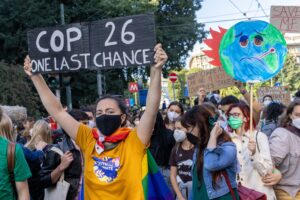
Following COP26 in November – and the renewed global commitments in areas like transport and deforestation that came out of it – 2022 will likely see an increasing focus on human rights impacts related to climate change. Extreme weather events will continue to disrupt livelihoods and drive migration – exacerbating vulnerability to trafficking and forced labour.
At the same time, efforts to mitigate and adapt to climate change can also carry significant risks. For example, much of the world’s supply of cobalt (a mineral needed to make batteries) comes from the DRC, where a recent report highlighted serious human rights challenges related to cobalt mining, including poverty wages, dangerous conditions and child labour. In this context, there is likely to be increased pressure for companies operating in these sectors to undertake robust human rights due diligence in their supply chains and operations.
There is a risk that the increasing spotlight on the human rights impacts of renewables will obscure those associated with fossil fuel production – such as pollution of water and food sources, as well as widespread job losses and labour risks related to the winding down of polluting industries such as coal. However, there is likely to be ongoing focus by unions and others on the “just transition” agenda – seeking to ensure that the rights of all workers and communities (especially those who currently depend on fossil fuels) are protected, and that the benefits of growing investment in the green economy transition are shared equitably.
Supply chain due diligence: from HRIAs to HRAPS
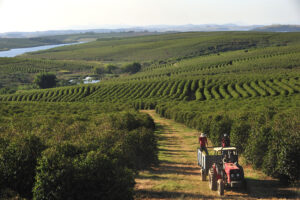
Against the background of growing awareness of poor conditions facing workers in agricultural supply chains (particularly women and migrants), there has been a notable interest in human rights impact assessments (HRIAs) as a key tool among food brands, retailers and civil society organisations who focus on this area. We have worked on eight such studies during 2021 (see Aldi South’s reports here on Brazil nuts, coffee and avocados), with more coming down the line. We are also conducting similar human rights impact assessments in a number of other sectors.
HRIAs, often advocated by NGOs such as Oxfam, have become a central feature in company efforts to go “beyond audit”. These studies aim to identify a clear understanding of potential business impact on human rights, taking into account root causes of human rights issues in projects or supply chains, and to develop targeted practical actions to address these potential impacts through a Human Rights Action Plan (HRAP). Typically, these Plans involve actions addressed to different business functions – such as procurement/buying, sustainability/CR, or human resources – which in turn involves internal discussions and development of shared understanding across the business. Through 2022 and beyond we expect to see considerable efforts around implementation, with the potential to bring about structural changes in the way companies do business to benefit, or at least lessen harm on, workers and communities.
Collaboration between brands will be increasingly important for HRIAs – not only in terms of actions on entrenched sectoral or societal issues, but also when commissioning studies. As more and more companies undertake HRIAs, duplication is likely – since the same supply chains are perceived as high risk and therefore worthy of an HRIA focus, and as brands and retailers often share similar suppliers. Pre-competitive collaboration on HRIAs would save resource, reduce pressure on suppliers and stakeholders that offer to participate in HRIAs, and support the development of larger scale, joint mitigation actions.
Testing year ahead for human rights in sport

2021 was an eventful year for human rights in sport with a continued increase in athletes from a wide variety of sports, speaking out on social and human rights causes (for example, see the cases of Lewis Hamilton, Tim Sparv). However, the case of Peng Shuai highlighted the risks that athletes face in voicing opinions and drew further attention to the challenges faced by women and girls. Tensions over whether and how athletes can exercise freedom of expression are likely to continue through 2022 and beyond, and it will be interesting to see how the Birmingham 2022 Commonwealth Games allows for athletes to voice opinions on social and ‘political’ causes.
2021 also saw the publication by the IOC of its Framework on Fairness, Inclusion and Non-discrimination on the basis of gender identity and sex variations. While proving inevitably controversial, given the polarised nature of the debate, this was also a significant step forwards in discussion of the issues.
The year ahead will also be bookended by two major sporting events mired in human rights controversies. Starting with the Beijing Winter Olympics, subject to a political boycott by the US, UK and others due to ongoing reports of forced labour in Xinjiang, the year will end with the FIFA World Cup Qatar 2022TM, which has already faced sustained scrutiny over the treatment of migrant workers and LGBTQI+ communities and visitors in Qatar.
Next year will also see the conclusion of the delayed bidding process for cities to host matches at the 2026 FIFA Men’s Football World Cup™️, a fascinating process which we have been supporting FIFA on. This process will take into account each bidding city’s plans to engage with stakeholders on human rights issues along with proposed measures to address any potential negative impacts associated with hosting the tournament.
Intense discussion over the role of sporting events in focusing attention on positive social change vs. their use as ‘sportswashing’ opportunities will continue.
ILO to add occupational safety and health as a Fundamental Right?
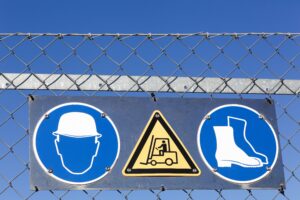
Against the stark backdrop of the ongoing COVID-19 pandemic, 2022 may also see the incorporation of ‘safe and healthy working conditions’ into the ILO’s framework of fundamental principles and rights at work, alongside the existing four themes of forced labour, child labour, non-discrimination and freedom of association and collective bargaining. The ILO estimates that globally 2 million people die from work-related accidents or diseases every year.
Current proposals would amend the 1998 Declaration to include occupational safety and health (OSH) as a fifth category of fundamental rights (with possible reference to C155 and C187 as the relevant fundamental conventions), implying an obligation on all member states to implement defined OSH standards. We can, therefore, expect renewed attention to OSH standards from national governments seeking to align with any new requirements and in response to increased scrutiny from the ILO’s supervisory mechanisms.
The proposed changes may also have implications for international trade agreements – many of which expressly require parties to adhere to the standards set out in the 1998 Declaration. The Declaration is also used as a reference point for numerous voluntary standards. The inclusion of OSH in the ILO Declaration would improve the organisation’s ability to support member states with vital technical support to build stronger and more resilient national OSH systems.
Living wage to remain a live issue
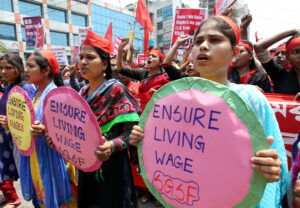
Ergon has continued its focused workstream on living wage, particularly in global supply chains, through 2021. Impetus continues to grow around the importance of business addressing living wage challenges, particularly in supply chains (though efforts have yet to achieve transformative scale). As the pandemic has amplified existing inequalities and vulnerabilities, this has reinforced the essential role of businesses in providing a decent standard of living and as a driving force in poverty eradication.
Following our work for the UN Global Compact earlier this year, in June 2021 the OECD-housed Business For Inclusive Growth (B4IG) coalition called on businesses to support and prioritise action on living wages, specifically identifying efforts such as the Call to Action on Living Wage launched by IDH earlier in 2021.
IDH, whom we continue to advise on living wage issues, has led the way in translating commitments into concrete, practical steps for businesses, developing a salary matrix, and establishing a ‘recognition’ procedure for living wage benchmarks, followed by a Roadmap on Living Wages in March 2021, and will continue to develop tools in 2022 to support companies to realise their commitments. IDH has also recently signed a partnership agreement with Fairtrade to accelerate joint work towards enabling living wages and income in agri-food systems, an area where we continue to see growing momentum.
There remain significant challenges in addressing supply chain wages in the context of supply chain pressures and increases in the cost of living: vitally, though we see an increasing appetite for collaboration and partnership – including actors such as the OECD, and institutional investors – which will be vital to addressing the structural drivers of low wages.